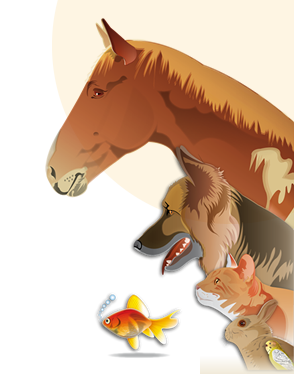
Useful tips for pet owners
Below are a selection of useful tips from The Pet Professionals.
To get more tips and advice join the Pet Professionals Club >
Greyfriars Bobby
Bobby was a Skye Terrier who supposedly visited his masters grave in Greyfriars Kirk, Edinburgh, daily for 14 years until his own death in 1872.
There is a bronze memorial to Bobby outside the Kirk and the story was made into a film by Walt Disney in 1961.
A wet nose!
It isn't true that a healthy dog always has a wet nose. Often a dog's nose is wet as they secrete moisture which helps their amazing sense
of smell. After sleeping it may be dry but its owner may be perfectly healthy!
Max factor!
Just like us humans, dogs can also get sunburnt in hot weather. Dogs with light and thin hair are more at risk. Areas around the ears,
eyes and nose are especially vulnerable and as in humans, sunburn increases the risk of developing skin cancer.
A sunscreen designed for babies may be used and some pet shops sell specific pet sun cream.
Collared!
Under the Control of Dogs Order 1992, all dogs must wear a collar and an identity tag whilst in a public place.
The tag must show the owner's name and address. Dog wardens can enforce this law and fines of up to
£5000 can be given by the Courts for an offence.
Hot dog!
When a dog gets hot, it loses heat by panting. Panting moves cooling air over the moist surfaces of the
tongue and lungs, rejecting heat to the atmosphere; this process is known as 'thermoregulation'.
They also lose heat through the pads of their feet.
Grapes!
Grapes and raisins pose a potential threat to dogs as some dogs will develop acute kidney failure after
ingestion. The reason for this is not known and the amount of grapes needed to cause problems
can vary considerably between different dogs.
Flea circus!
Preventing and controlling fleas in your dog is a multi-step process. It involves killing the fleas on your dog
and also eliminating the eggs which are shed into the environment. So you have to treat your pet and your home if you are to succeed!
Be sociable
'Socialisation' is the process whereby a dog learns how to recognise and interact with other dogs and other
species including humans. There is a sensitive period of development in which this 'socialisation' must occur and
this window of opportunity closes within 12 to 16 weeks of age. After the window closes, unfamiliar people, objects
and experiences are approached with caution and may become fearful, which could ultimately lead to aggression.
Smelly!
The part of the dog's brain that is responsible for interpreting smells is forty times bigger than that of a human's.
A dog's sense of smell is between a 1,000 and 10,000,000 times better than a human's, depending on the breed.
The wet mucus on a dog's nose helps it to smell by collecting scent particles.
Food time
A dog should be fed at the same time every day. Most owners feed at least two meals per day but some dogs
are only fed once daily. It's also a good idea to stick with the same type of food and brand to prevent
digestive upsets. Fresh, clean water should be available at all times.
How old?
It's often said that you can calculate your dog's age in human years by multiplying his actual age by seven.
In reality this calculation is a bit rough and ready as it takes no account of size and breed.
Stick to it!
Although it's tempting to throw a stick for your dog to chase and retrieve, this can be highly dangerous.
The most common injury occurs when a dog runs into a stick that has stuck into the ground, forcing the stuck into the
back of its throat. So throw a ball or nylon toy instead!

